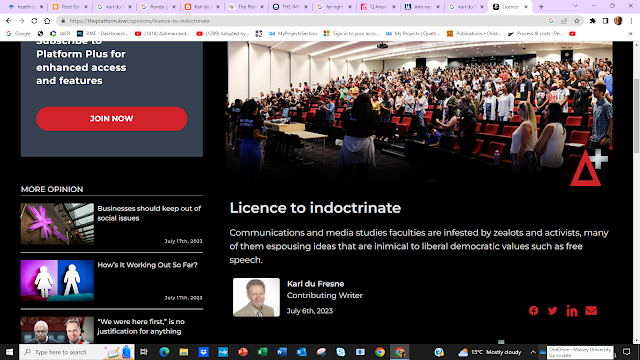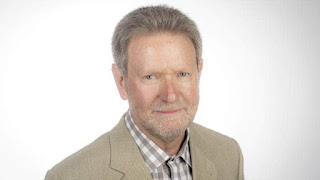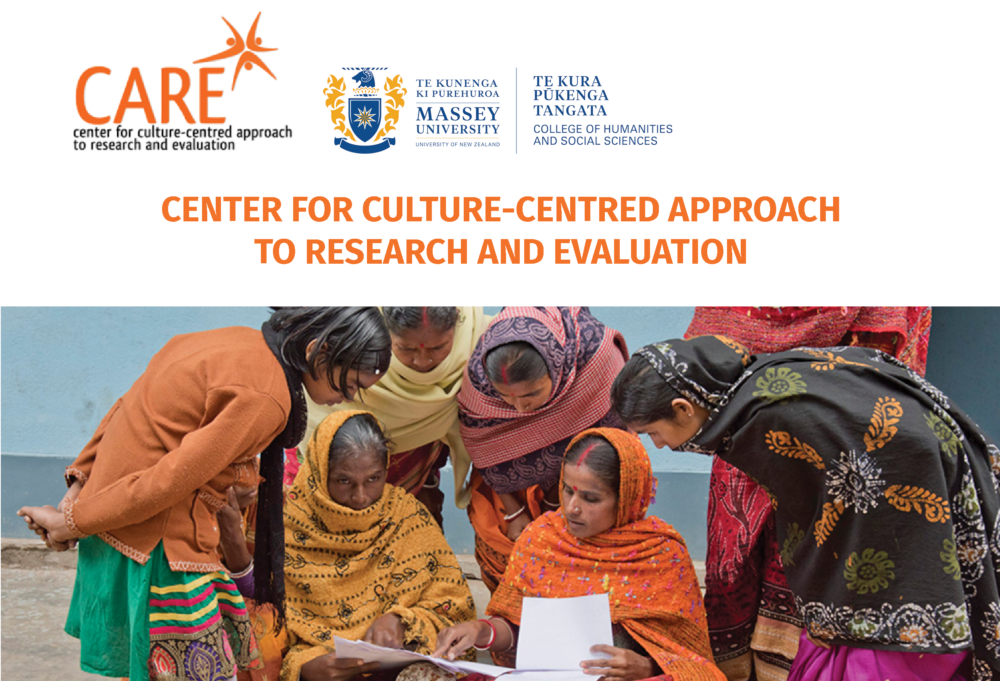Tuesday 25 July 2023 | By Professor Mohan Dutta
This opinion piece is part of a five-part series on the organised attack of the far right on communication and media studies pedagogy. This ecosystem has picked me as a sample case for all that is wrong with the discipline as a propaganda instrument of what it terms the “Left Woke Agenda.”

I had not heard the name Karl du Fresne. Apparently he’s a New Zealand journalist and blogger writing opinion pieces for The Platform – an outlet that has in the past circulated misinformation, hosted conspiracy theories, and participated in practices that might be considered unethical by journalistic standards.

(Image source: Robert Kitchin/stuff;
www.stuff.co.nz website)
Earlier this month, a journalist reached out to me on Twitter, sharing that du Fresne had written a hit piece for The Platform targeting me. They commiserated with me, sharing how they were also the target of an attack carried out by du Fresne earlier, directed at their employer and attacking their livelihood.
Fairly certain what the attack might look like, given the organised campaign by the far-right infrastructure targeting the academic freedom of scholars writing on issues of social justice (particularly racial and gender justice) and challenges around the Sustainable Development Goals (specifically gender equality, reduced inequality and climate change) across the globe (largely imported from the US-Infowars-Bannon-Trump-DeSantis-Tucker-Carlson hate machinery), I was curious to explore what a New Zealand take on this ecosystem would look like.
Unfortunately, what I found when I dug up the article was a shabby hit piece, replete with its uninspiring tediousness, parroting the far-right conspiracy themes from the Infowars-Trump-Bannon universe, and demonstrative of the organised attack on critical literacy directed at silencing the questioning of entrenched forms of power in society.
The article begins with the title “A blank canvas for stokers of the culture wars.” The framing of the title, portraying Aotearoa as a blank canvas, juxtaposed against the “stokers of culture wars” phrase gives away the racist ideology that drives the article.
To frame Aotearoa as a blank canvas for supposedly imported conspiracists like me (more on this later), du Fresne has to erase tangata whenua and the history of Māori activism against colonisation, racism, and white supremacy. The suggestion that stokers of culture wars are bringing in our “outsider” and therefore, impure ideologies of social justice in Aotearoa is racist, both in erasing long-held Māori leadership in struggles for justice here and globally, and in marking me, an ethnic migrant, as the wrong kind of migrant bringing in dangerous ideas that are corrupting Aotearoa by “stoking culture wars.”
Du Fresne also strategically obfuscates his own familial history as Tangata Tiriti, as manuhiri (visitor or guest) to this land.
As the article rolls on with its rhetorical fallacies, it seems obvious that what du Fresne seems to have an issue with is the fact that I teach and research at a University in Aotearoa. As a way to set up his attack, he targets the language that describes my programme of research on the Massey University website, suggesting the language used on the website is part of a radical conspiracy. He copies and pastes extensively from the website, stating that the description is “written in a dialect that most people would find almost incomprehensible.”
In democracies, it is the work of journalists to do the critical work of translating scholarship for the public. Of course, for bloggers such as du Fresne speaking to a right-wing conspiracy web while posing as a journalist, that would be too much work. Such work would entail doing research and learning, calling on critical pedagogy that is cultivated through rigorous journalism education, grounded in communication and media theory, participating in critical analyses of power (especially when reporting on social science and humanities scholarship), and drawing on critical engagement with questions of ethics in reporting.
Suggesting that making the language incomprehensible is purposeful and part of a larger conspiracy, du Fresne then goes on to write:
“Elite groups have always used their own coded jargon to project (and protect) their power, to enhance their aura of exclusivity and to impress the impressionable. The object is not to explain, as most language strives to do, but to obscure, presumably in the hope that no one will detect its phony portentousness. No one does this stuff better than neo-Marxist academics.”
Note here the slippery slope du Fresne embarks on, placing me as part of an elite group and implying that this group is part of a global conspiracy web to uphold and perpetuate power. This elite group does so through propaganda. In the conspiracy web that du Fresne cooks up, this elite group seeks to establish a Marxist global order, and it does so through the use of “coded jargon.”
His conspiracy draws directly from the misinformation-based discursive frames weaved by the Alt-Right. In this conspiracy web woven together by white supremacists, a global Communist conspiracy is being ushered in by Marxists, working alongside and/or being funded by the Chinese Communist Party, and intertwined with the agendas of the World Economic Forum, United Nations etcetera to secretly rule the world.
Critical to the propaganda woven by the far-right is mobilisation against knowledge and the university, and by extension, academics. Also worth noting is the specific targeting of social justice scholarship within the academe as an exemplar of the Neo-Marxist conspiracy.
For the far right, the framing of the teaching of theories of social justice in the academe as Marxist conspiracy works as a strategy for silencing the voices of Indigenous, Black, and migrants of colour communities. The white supremacist hegemony of the far-right sees the organising for justice from the margins as threatening to the status quo. Its conspiracy web therefore communicatively inverts materiality, inverting historic processes of racist marginalisation on their head to portray voices advocating for social justice as the elites occupying power.
Another communicative inversion performed here by du Fresne is the framing of social justice scholarship as an imported idea, all along inverting the direct replication of American far-right talking points in the article. The actual “culture wars” that are imported into Aotearoa are the far-right mobilisation of white supremacist cultural nationalism to attack academic freedom, in direct violation of the Education Act 1989, section 268 of the Education and Training Act 2020, and in continuity with the racist settler colonial infrastructure of Aotearoa.
Du Fresne then goes on – “The university system is awash with this gibberish – a fact that would be comical if we weren’t paying for it.”
Accountability to the taxpayer is one of the key resources in the mobilisation of the far-right. Designating themselves as gatekeepers, as representatives and advocates of the voices of the tax payer, far-right individuals and organisations launch their attacks on academic freedom by claiming that the research and teaching on questions of social justice are a waste of taxpayer money.
In portraying an entire body of scholarship (in this case, my research programme exploring the structural determinants of health inequalities and the communicative strategies for addressing these inequities) as gibberish, du Fresne demonstrates his lack of credibility as a journalist. He doesn’t really understand the scholarly process, much like other demagogues in this category who seek to find relevance through organised attacks based on heuristics.
The process of academic peer review, albeit with its multiple limitations, based on the participation in a rigorous peer review process by a community of scholars, establishes the credibility of knowledge. Within the academic community of experts, knowledge is contested, theories are offered and tested, and concepts subjected to empirical examination in an ongoing process of scholarly engagement. Any journalist writing about academic research programmes is expected to do the homework to understand how scholarly knowledge is produced, be ready to study the research programme, and equip oneself then to report on it. This process of engagement calls for deep reading, based on rigour. Of course, for bloggers such as du Fresne, this sort of painstaking and rigorous work is not conducive to generating superficial memes that speak to the conspiracy web.
Du Fresne cherry picks some examples from my research programme:
“The second conclusion we can reach on the basis of his profile is that Dutta is adept, like many of his ilk, at tapping into public funds – in this case from the AHRQ, which is part of the US Department of Health, and the National University of Singapore (NUS). The poor working schmucks whose taxes fund these institutions have no knowledge of, and even less control over, the radical agendas they enable.”
Once again, to comment upon specific research projects would call for actually educating oneself on the nuts and bolts of the research (not just google a webpage!). The US$1.5 million grant, funded by the Agency for HealthCare Research and Quality that he refers to, built on my research programme on the culture-centered approach, a framework I have developed over two decades of community engaged-health communication research that is recognised as a significant programme of research that has shaped the discipline, was designed to co-create a framework for disseminating the evidence-based comparative effectiveness research on heart health medications among the underserved African American communities in Lake and Marion Counties of the US. African American communities in the US experience disproportionate burdens of heart disease.
In this backdrop, the community-led culture-centered intervention, co-created through partnership with a range of African American organisations, and evaluated through a quasi-experimental community-based design, was effective in building community knowledge of heart health prevention and treatment. This intervention is an example of the sort of social impact generated by theory-driven scholarship. It is therefore both ironic and absolutely reflective of the disenfranchising agenda of white supremacy that du Fresne would target the AHRQ funded programme, framing it as being driven by a radical agenda (more on this in a follow-up piece).
You might ask, ‘Why does du Fresne pick on the AHRQ-funded intervention?’ For propagandists in the Alt-Right ecosystem, community health initiatives led by racially marginalised and historically oppressed communities is radical agenda. For these propagandists, reducing inequities in health outcomes is radical agenda. For the propaganda infrastructure of hate, historically marginalised communities having a voice in decision-making is radical agenda. Because the social order they so miss and would like to continue perpetuating is one where white supremacy rules, uncontested and unchallenged.
As I noted earlier, such propaganda in Aotearoa also has to erase the history of organising against health inequalities by Māori and the extensive body of Kaupapa Māori-based literature challenging these health inequalities to somehow make up the propaganda narrative that such ideas of health justice are imported ideas from the US, all the while parroting the US-based white supremacist agenda.
Professor Mohan Dutta is Dean’s Chair Professor of Communication. He is the Director of the Center for Culture-Centered Approach to Research and Evaluation (CARE), developing culturally-centered, community-based projects of social change, advocacy, and activism that articulate health as a human right. He is a member of the board of the International Communication Association.
Original article: source: http://culture-centered.blogspot.com/2023/07/the-far-rights-attack-on-communication.html by Prof. Mohan Dutta
Article source: https://www.massey.ac.nz/about/news/opinion-the-far-rights-attack-on-communication-and-media-studies/
